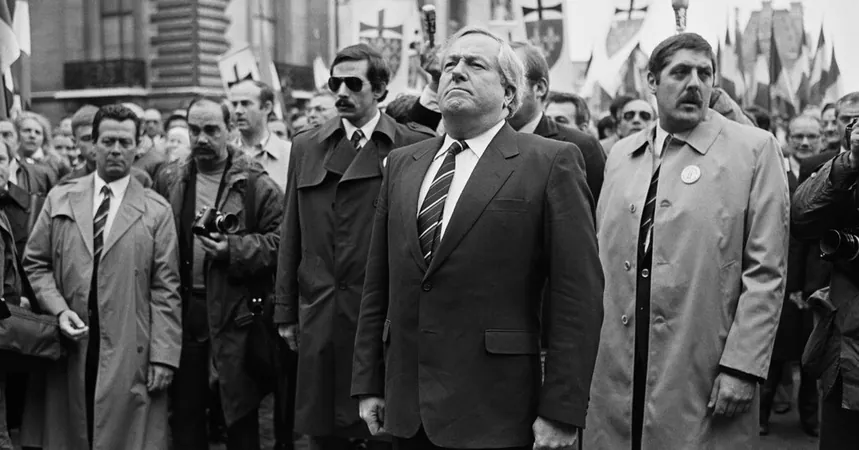
Jean-Marie Le Pen, Notorious Figure in French Far Right Politics, Passes Away at 96
2025-01-08
Author: Ting
Jean-Marie Le Pen's Death
Jean-Marie Le Pen, the controversial architect of France's modern far-right movement, has died at the age of 96 in Garches, west of Paris. His death, confirmed on social media by Jordan Bardella, the current president of the National Rally party, marks the end of an era for a figure whose political career spanned nearly fifty years, steeped in accusations of racism, antisemitism, and extremist rhetoric.
Health and Family Changes
Le Pen's frail health had led to significant changes in his family structure; in April 2024, a French court granted legal guardianship to his daughters amid concerns over his wellbeing following a heart attack.
Political Career and Presidential Bids
Known for his provocative and incendiary speaking style, Le Pen attempted to win the French presidency five times, reaching the runoff in 2002, where he capitalized on a wave of societal discontent and anti-immigrant sentiment.
Marine Le Pen's Leadership
His youngest daughter, Marine Le Pen, took over the leadership of the National Front (now National Rally) in 2011. Marine successfully navigated the party through a rebranding effort and attempted to soften its previous hardline stances.
2022 Presidential Bid
Despite three failed presidential bids—most notably in 2022 when she garnered 41.5% of the vote against incumbent Emmanuel Macron—her leadership saw a significant rise in representation for the party in Parliament, reflecting a troubling shift in France’s political landscape.
Support for Macron's Immigration Bill
In a notable turn of events, the National Rally openly supported Macron’s immigration bill in 2023, signalling a potential convergence of interests between the far-right and mainstream politics in France.
Rise in Legislative Strength
By 2024, the party's legislative strength surged to 140 seats, further embedding right-wing representation in government.
Le Pen's Vision for France
Le Pen's vision of France was rooted in what he termed a "natural order" based on family and national identity, opposing immigration and promoting traditional values.
Division and Political Landscape
His platform often veered towards division, capitalizing on insecurities felt by the working class, particularly during economic downturns, which fueled a broader right-wing movement across Europe.
Controversies and Legal Challenges
Despite a history marred by convictions for hate speech and Holocaust denial, Le Pen maintained a loyal base of support, not exclusively comprised of extremists, but often including everyday citizens disenchanted with the political elite.
Early Career and National Front
His early political career began in 1956, gaining notoriety through the founding of the National Front in 1972. Throughout his life, he faced legal challenges due to inflammatory statements, inciting racial hatred, and downplaying the severity of the Nazi occupation during World War II.
Le Pen's Complex Legacy
A complex figure, Le Pen's life was punctuated by dramatic moments, including his early years spent in the French Foreign Legion and allegations of participation in torture during Algeria's war for independence.
Polarizing Figure Until the End
He remained a polarizing force until the end, often broaching topics that fanned the flames of division within French society.
Reflections on French Politics
Across the decades, Le Pen's divisive approach underscored a broader political shift in France, one that reflects deep-rooted tensions around issues of identity, immigration, and economic distress. His legacy, controversial and far-reaching, continues to provoke strong reactions as France grapples with the implications of his long-standing ideologies and the far-right movement’s growing presence in national politics.


 Brasil (PT)
Brasil (PT)
 Canada (EN)
Canada (EN)
 Chile (ES)
Chile (ES)
 Česko (CS)
Česko (CS)
 대한민국 (KO)
대한민국 (KO)
 España (ES)
España (ES)
 France (FR)
France (FR)
 Hong Kong (EN)
Hong Kong (EN)
 Italia (IT)
Italia (IT)
 日本 (JA)
日本 (JA)
 Magyarország (HU)
Magyarország (HU)
 Norge (NO)
Norge (NO)
 Polska (PL)
Polska (PL)
 Schweiz (DE)
Schweiz (DE)
 Singapore (EN)
Singapore (EN)
 Sverige (SV)
Sverige (SV)
 Suomi (FI)
Suomi (FI)
 Türkiye (TR)
Türkiye (TR)
 الإمارات العربية المتحدة (AR)
الإمارات العربية المتحدة (AR)